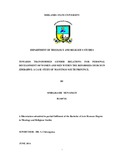Please use this identifier to cite or link to this item:
https://cris.library.msu.ac.zw//handle/11408/703| Title: | Towards transformed gender relations for personal development of women and men within the reformed church in Zimbabwe: a case study of Masvingo South pPovince. | Authors: | Munamati, Simbarashe | Keywords: | Gender relations Personal development |
Issue Date: | 2014 | Publisher: | Midlands State University | Abstract: | The dissertation explores transformed gender relations for personal development in The Reformed Church in Zimbabwe (RCZ) of Masvingo South Province by investigating leadership history from its formation in 1909 to present. Chapter 1 investigates the historical background of the problem, unequal representation of female church members in leadership positions and decision making boards. This tradition is against transformed gender relations between females and males in the church. This practice seems to be influenced by the Dutch Reformed Church Missionary approach, Shona Culture and the current Reformed Church in Zimbabwe structures. Tenets of Liberal feminism will be the main focus of this research. In addition to this, this chapter focuses on a brief history of the Reformed Church of Zimbabwe in general and then with special reference to Masvingo South Province of Zimbabwe. Chapter 2 focuses on the effects of the Dutch Reformed Missionary approach, Shona culture and the current Reformed Church Structures on gender relations between women and men of The Reformed Church in Zimbabwe of Masvingo South Province. Chapter 3 presents the empirical part of the research. Male and female participation in the Reformed Church in Zimbabwe of Masvingo South is analysed through qualitative research methods. Chapter 4 is anchored on strategies which the Reformed Church in Zimbabwe of Masvingo South Province has to employ to attain transformed gender relations between females and males where spiritual and material development will be promoted. It picks up strategies towards gender sensitivity and equity, confronting organisational double standards and developing women friendly organisational culture. The research proved that women and men are participating in all church leadership positions and decision making boards but men still enjoy a larger share at the expense of women who constitute more than 75% of church membership. | URI: | http://hdl.handle.net/11408/703 |
| Appears in Collections: | Ba In Theology And Religious Studies Honours Degree |
Files in This Item:
| File | Description | Size | Format | |
|---|---|---|---|---|
| RESEARCH PROPOSAL 2013 munamati _Final Document_.pdf | 289.31 kB | Adobe PDF |  View/Open |
Page view(s)
180
checked on Jan 11, 2026
Download(s)
70
checked on Jan 11, 2026
Google ScholarTM
Check
Items in MSUIR are protected by copyright, with all rights reserved, unless otherwise indicated.



